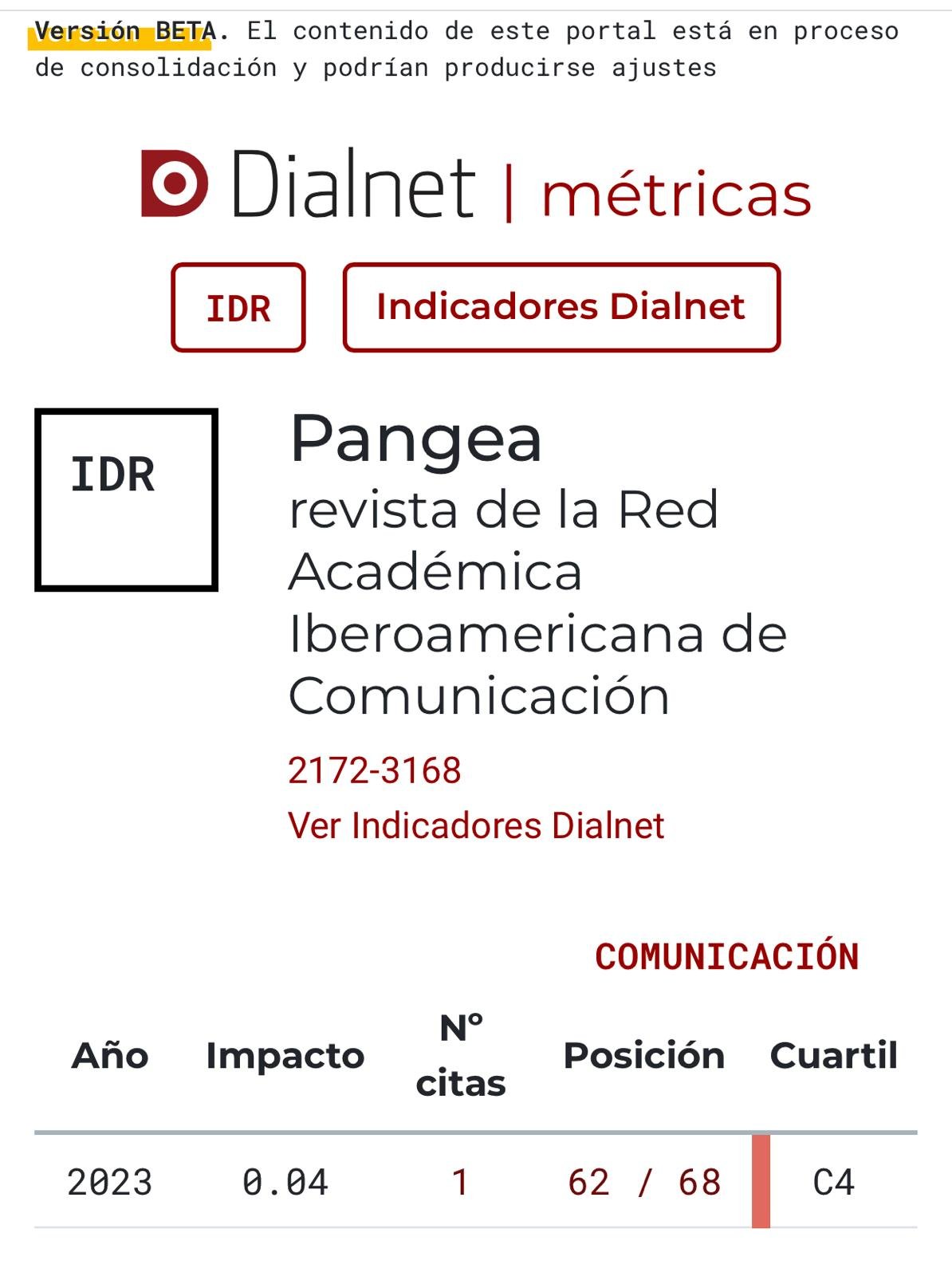A pandemic tour of technology-mediated teaching practices from the perspective of technological determinism
DOI:
https://doi.org/10.52203/pangea.v12i1.127Keywords:
Technological determinism, COVID-19, Chicago School, Toronto School, Communication theoryAbstract
Technological determinism was born in the Chicago School with figures like William Ogburn, and shows us its most radical version in Jacques Ellul. But it will be Marshall McLuhan, promoter of the Toronto School, who transcends this approach, since technology goes from being the determining factor per se to the determining factor in social progress and planetary globalisation. The essence of these ideas lies in the autonomous capacity of technology, becoming the “determining factor”.
During the pandemic we have and are once again witnesses to this fact, and it is the analysis of it that is the purpose of this essay. Communication has been the subject of a redefinition on a global scale that highlights the inescapable presence of determinism in our days; so much so, that he unstoppably enters the classroom. Are technological determinism and teaching compatible? Can the former be a tool for the latter? We deal with that in the following lines.
Under these deterministic approaches and postulates, which are part of the traditions of communication studies, we propose to analyse as an essay the role that the media have played during the COVID-19 pandemic. Undoubtedly, this necessary revisionism and tension of classical theories with current contexts, loaded with uncertainties and relativisms, constitute a contribution to the necessary discussions that must take place.
References
Ardini C., Barroso M.B., Corzo A. (2020). Herramientas digitales de comunicación en contexto COVID 19. El impacto en la relación estudiantes-instituciones educativas en Argentina. Disponible en: https://comhumanitas.org/index.php/comhumanitas/article/view/251/235.
Arribas, A. (2021). Fundamentos de biotecnocomunicología. De McLuhan a Kurzweil vía Hawkins. Chasqui. Revista Latinoamericana de Comunicación. Tribuna, 147, pp. 15-35.
Azpurua, F. (2005). La Escuela de Chicago. Sus aportes para la investigación en ciencias sociales. SAPIENS, 6 (2). Caracas.
Beltrán Prieto, P. (sin fecha). “Los seis tipos de galaxias y sus características”. medico-plus.com. https://medicoplus.com/ciencia/tipos-galaxias
Chalmers, A. (2000). ¿Qué es esa cosa llamada ciencia? Madrid: Siglo XXI.
Chomsky , N. y Ramonet, I. (1995). Cómo nos venden la moto. Barcelona: Icaria.
Dayan, D. (1997). En busca del público. Barcelona: Gedisa.
Dewey, J. (1958). El público y sus problemas. Buenos Aires: Editorial Ágora.
Díaz, C. (2014). Jaques Ellul. Madrid: Fundación Emmanuel Mounier.
Diéguez, A. (2013). La filosofía de la técnica de Ortega como guía para la acción. Una comparación con Heidegger. Revista Internacional de Tecnología, Conocimiento y Sociedad, 2 (1), pp. 73-97.
Durst, R.K. (1987). Cognitive and linguistic demands of analytic writing. Research in the Teaching of English, 21, 347-376.
Ellul, J. (1954). La technique ou l’enjeu du siècle. Ed. Wilkinson, J. (1964), The TechnoLogical Society. New York: Knopf.
Martín-Barbero, J. (2000). Retos culturales: de la comunicación a la educación. Nueva sociedad, 169, pp. 33-43.
Ogburn, W. F. (1933). Recent Social Trends in the United States. Nueva York: McGraw-Hill.
Saperas, E. (2012). Comunicación mediática y sociedad. Manual de Teorías de la comunicación. Madrid: OMM editores.
Grandi, R. (1995). Texto y contexto en los medios de comunicación. Barcelona: Bosch.
Marian, M. (2017). De una teoría crítica de la sociedad a una teoría crítica digital. Roma: Aracne Editrice.
Marques Rollison, J. (2020). A New Reading of Jacques Ellul: Presence and Communication in the Postmodern World. Lexington Books: 2020.
McLuhan, M. (1996). Comprender los medios de comunicación. Las extensions del ser humano. Barcelona: Paidós.
McLuhan, M. (2002). The Mechanical Bride: Folklore of Industrial Man. Canadá: Ginko Press.
McLuhan, M. (2003a). Understanding media: The extensions of man. Canadá: Gingko Press.
Munson, E.; Warren, C. (1997). James Carey: A critical reader. Minnesota: University of Minneapolis Press.
Le Partage (4 enero 2015). Jacques Ellul - Le Système Technicien. https://www.youtube.com/watch?v=01H5-s0bS I&list=PL3cGDmfkGjiG0emUiW6m2UpO_PXhWJfCW.
Ordóñez, C. (2001). Instrucciones de redacción de un ensayo argumentativo. Manuscrito no publicado, Maestría en Educación. Universidad de los Andes, Colombia.
Roncallo-Dow, S. (2014). Marshall McLuhan. El medio (aún) es el mensaje. 50 años después de Understanding Media. Palabra Clave, 17 (3): 582-588. Disponible en: http://dx.doi.org/10.5294/pacla.2014.17.3.1.
Sanchís-Serra, A. D. (2011). Introducción al pensamiento social de Jacques Ellul. Madrid: Aeibus.
Scolari, C. (2008). Hipermediaciones. Elementos para una Teoría de la Comunicación Digital Interactiva. Barcelona: Gedisa.
Scolari, C. (2015). Los ecos de McLuhan: ecología de los medios, semiótica e interfaces, 18, (4): 1025-1056. http://dx.doi.org/10.5294/pacla.2015.18.4.4.
Tijmes, P. (2002). Jacques Ellul, entre el pesimismo sociológico y la esperanza bíblica. Países Bajos: Enschede. Disponible en: http://habitat.aq.upm.es/boletin/n37/aptij.html.
Downloads
Published
Issue
Section
License
Copyright (c) 2021 Marta Zambudio Meseguer

This work is licensed under a Creative Commons Attribution-NonCommercial-NoDerivatives 4.0 International License.
https://creativecommons.org/licenses/by-nc-nd/4.0/deed.es





